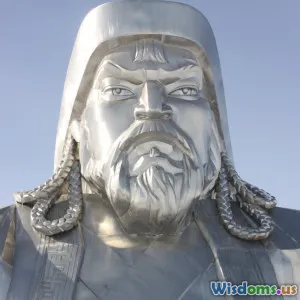
Top 10 Most Influential Figures in World History You Never Heard Of
8 min read Discover 10 revolutionary world figures you likely never heard of who shaped history profoundly. (0 Reviews)
Top 10 Most Influential Figures in World History You Never Heard Of
History is often told through the lens of famous kings, queens, warriors, and inventors—figures whose names dominate textbooks and public memory. But much of the world’s transformation owes itself to individuals whose legacies are eclipsed despite playing pivotal roles in shaping history. This article uncovers ten such fascinating figures whose remarkable influence on culture, science, politics, and society remains largely unsung today. Prepare to be amazed by stories of innovation, resilience, and vision from beyond the traditional historical spotlight.
1. Hedy Lamarr: The Hollywood Star and Wireless Pioneer
Many know Hedy Lamarr as a glamorous actress of Hollywood's Golden Age, but few realize she was also an inventor whose technological genius laid foundations for modern wireless communication. During World War II, Lamarr co-developed a frequency-hopping system designed to prevent radio-controlled torpedoes from being jammed. This technique is the conceptual ancestor of today's Wi-Fi, GPS, and Bluetooth technologies. Lamarr’s pioneering work went largely unrecognized in her lifetime, illustrating how innovation sometimes hides beneath the surface of celebrity.
“Invention is the most important product of one’s creative brain. The ultimate key is imagination.” — Hedy Lamarr
2. Sybil Ludington: The Teenage Rider Who Warned the Colonies
Often overshadowed by Paul Revere, 16-year-old Sybil Ludington made a heroic midnight ride in 1777 during the American Revolutionary War across roughly 40 miles in New York to alert militia forces of a British attack. Her bravery mobilized American forces crucial to defending key areas against British troops, yet her contribution remains under-celebrated.
3. Ching Shih: The Pirate Queen Who Ruled the South China Sea
Few know Ching Shih, a former prostitute turned pirate leader in early 19th century China, commanded one of the largest and most powerful pirate fleets in history. With strategic brilliance and strict codes of conduct, she controlled over 300 ships and tens of thousands of pirates. Her fleet’s dominance challenged the Qing government and foreign powers alike, eventually securing her a pardon and a comfortable retirement—a rare achievement for a pirate lord.
4. Ibn al-Nafis: Discoverer of Pulmonary Circulation
Long before William Harvey, Ibn al-Nafis, a 13th-century Arab physician, accurately described the pulmonary circulation of blood—the process of blood passing through the lungs. His work dismantled prevailing misconceptions from Galen’s ancient theories. Despite his groundbreaking physiological insights, Ibn al-Nafis remained unknown to much of the Western medical community for centuries.
5. Noor Inayat Khan: The Secret Wireless Operator of WWII
Daughter of an Indian Sufi mystic and living in Britain, Noor Inayat Khan became a spy during World War II. As one of the few female wireless operators in Nazi-occupied France’s resistance, she transmitted critical intelligence despite immense danger. Eventually captured and executed by the Gestapo, Khan is remembered as a symbol of courage and calm under pressure.
6. Nikola Tesla’s Croatian Collaborator, Marko Tesla
While Nikola Tesla, the inventor and electrical engineer, is celebrated globally, few know about his uncle and mentor Marko Tesla, who encouraged Nikola’s curiosity and education from an early age. Marko’s role in fostering Nikola’s prolific genius demonstrates how family mentorship critical to groundbreaking innovation often goes unnoticed.
7. Mary Anning: The Fossil Hunter Who Changed Paleontology
In the early 19th century, Mary Anning, a self-taught fossil collector in England, made numerous discoveries of Jurassic marine fossils, including the first correctly identified ichthyosaur skeleton. Despite her immense contributions to paleontology, she was excluded from scientific circles because of her gender and social class, ultimately only gaining proper recognition after her death.
8. Bessie Coleman: Pioneering African-American Female Aviator
Bessie Coleman was the first African-American woman and first Native American to hold a pilot license. Facing racial and gender barriers in the United States, she courageously traveled to France to acquire her license in 1921 and returned as a stunt pilot advocating aviation and breaking stereotypes. Her legacy inspired generations of pilots of color.
9. Al-Khwarizmi: Father of Algebra and Algorithm
While modern technology owes much to computer science, few recognize Muhammad ibn Musa al-Khwarizmi, a 9th-century Persian polymath. His pioneering works on algebra laid the foundation for the subject itself—the term “algebra” deriving from his book "Al-Kitab al-Mukhtasar fi Hisab al-Jabr wal-Muqabala". Similarly, the word “algorithm” honors his name. His mathematical legacy profoundly influenced both medieval Europe and Islamic scientific advancement.
10. Wangari Maathai: Environmentalist and Human Rights Advocate
A more contemporary figure, Wangari Maathai’s story deserves mention. As a Kenyan environmental activist and the first African woman Nobel Laureate, she founded the Green Belt Movement, empowering communities through tree planting and sustainable development. By merging environmental preservation with social justice, her visionary work reshaped community activism and international environmental policies.
Conclusion: Unearthing the Silent Architects of History
The figures outlined here remind us that history is far richer and more diverse than the oft-repeated stories of kings and conquerors. Their legacies—whether through science, social resistance, innovation, or leadership—continue to influence our world in profound ways. Exploring these lesser-known but impactful voices can inspire a deeper appreciation for the mosaic of human achievement. Recognizing these unsung heroes enriches our historical understanding and encourages us to seek untold stories in the fabric of our shared past.
History is not only the story of the famous but also the enduring ripple effects of countless unseen contributors whose excellence changed the fate of humanity.
Embrace these revelations, and perhaps consider whose names and stories you can uncover and share next.
Rate the Post
User Reviews
Popular Posts




















